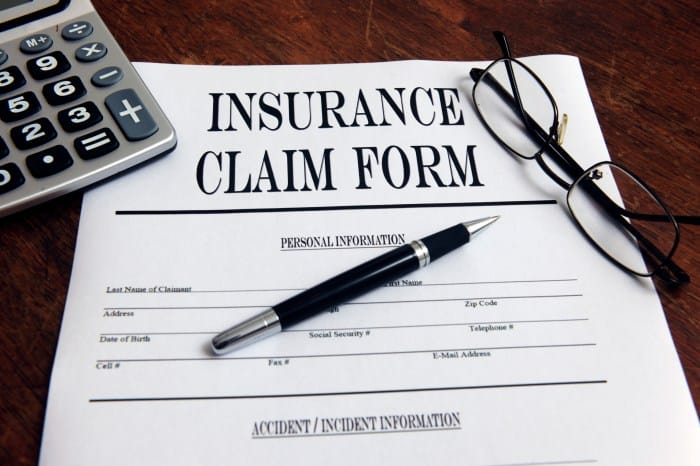When dealing with insurance claims, navigating the intricacies of the process can be daunting. Insurance adjusters play a crucial role in determining the outcome of your claim. Building a positive relationship with them and understanding their perspective can significantly impact the success of your claim.
In this comprehensive guide, we’ll delve into the world of insurance adjusters, providing practical tips and strategies to help you effectively communicate, gather evidence, negotiate settlements, and resolve disputes. Whether you’re dealing with property damage, health insurance, or auto insurance claims, this guide will equip you with the knowledge and skills to navigate the insurance landscape with confidence.
Initial Contact

Establishing a positive rapport with the insurance adjuster from the start is crucial for a successful claim process. A friendly and cooperative approach can make a significant difference in the adjuster’s willingness to work with you and provide a fair settlement.
During the initial interaction, effective communication is key. Speak clearly and concisely, providing all necessary information without overwhelming the adjuster with unnecessary details. Actively listen to their questions and concerns, demonstrating your understanding and willingness to cooperate.
Professionalism and Courtesy
- Greet the adjuster politely and introduce yourself.
- Be respectful and courteous, even if you are frustrated or upset.
- Avoid accusatory or confrontational language.
Clear and Concise Communication
- Speak clearly and slowly, ensuring the adjuster understands your concerns.
- Avoid using jargon or technical terms that the adjuster may not be familiar with.
- Be specific and provide concrete examples to support your claim.
Active Listening
- Pay attention to what the adjuster says and ask clarifying questions if necessary.
- Demonstrate that you understand their perspective and are willing to work together.
- Avoid interrupting the adjuster while they are speaking.
Documentation and Organization

Effective documentation and organization are key aspects of a successful claims process. Maintaining thorough records ensures a clear understanding of the claim, enabling timely and accurate communication with the insurance adjuster. By organizing documents efficiently, you can easily locate relevant information, saving time and ensuring a smoother resolution.
Establishing a File System
- Create a dedicated file system for the claim, both physically and digitally.
- Use descriptive file names to identify documents quickly.
- Organize documents chronologically or by category for easy retrieval.
Documenting Communication
- Maintain a record of all communication with the insurance adjuster, including emails, phone calls, and meetings.
- Keep notes during conversations, including the date, time, and key points discussed.
- Request copies of all correspondence and documents provided by the insurance adjuster.
Gathering Supporting Evidence
- Collect all relevant documentation related to the claim, such as repair estimates, medical bills, and police reports.
- Organize receipts, invoices, and other financial records to support your claim.
- Take photographs or videos of the damage or injury to provide visual evidence.
Preparing a Detailed Claim File
- Create a comprehensive claim file that includes all relevant documents, organized in a logical manner.
- Ensure the file is complete and accurate before submitting it to the insurance adjuster.
- Keep a copy of the claim file for your records.
Communicating Effectively
- When communicating with the insurance adjuster, be clear, concise, and professional.
- Provide specific details about the claim, including the date, time, location, and circumstances.
- Be prepared to answer questions and provide additional information as needed.
Understanding the Insurance Policy

Comprehending the terms and conditions of your insurance policy is paramount in ensuring you receive the coverage you’re entitled to. Insurance policies are often intricate documents, but understanding them is vital for a seamless claims process.
To effectively interpret complex policy language and identify relevant coverage, consider the following:
Policy Jargon and Legal Terms
- Familiarize yourself with common insurance terminology and legal phrases. Many policies contain specific definitions for terms used throughout the document.
- If there are terms you don’t understand, consult a dictionary or online resources that explain insurance terms in plain language.
- Reach out to your insurance agent or company’s customer service department for clarification on confusing terms or concepts.
Coverage Details and Exclusions
- Scrutinize the policy to understand the types of coverage you have, the limits of your coverage, and any exclusions or limitations that may apply.
- Pay attention to specific details such as deductibles, co-payments, and coinsurance requirements, as these can impact the amount you’ll pay out of pocket for covered expenses.
- Review the policy’s claims process and any time limits or deadlines for filing a claim.
Endorsements and Riders
- Endorsements and riders are additions or amendments to your policy that can modify the coverage provided. Read these carefully to understand any changes they make to your policy’s terms and conditions.
- If you have questions about endorsements or riders, contact your insurance agent or company for clarification.
Evidence Gathering

In the process of filing an insurance claim, the submission of relevant evidence plays a pivotal role in substantiating the claim and ensuring a favorable outcome. Different types of evidence are required to support various insurance claims. These may include, but are not limited to:
- Documentation of Loss: This includes invoices, receipts, and estimates for repairs or replacements. For property damage claims, photographs of the damaged property are also essential.
- Medical Records: For health insurance claims, medical records, including doctor’s notes, test results, and prescriptions, are necessary to prove the medical condition and the extent of treatment.
- Police Reports: In cases involving accidents or theft, police reports serve as crucial evidence to establish the circumstances and liability.
- Witness Statements: Statements from witnesses who have firsthand knowledge of the incident can corroborate the claim and strengthen its credibility.
- Expert Opinions: In complex cases, expert opinions from professionals, such as appraisers, contractors, or medical specialists, can provide valuable insights and support the claim.
Gathering evidence effectively is paramount to the success of an insurance claim. Here are some key strategies to consider:
Organizing Evidence
Maintaining a well-organized system for evidence is essential. This involves creating a dedicated file or folder, either physical or digital, to store all relevant documents, photographs, and other supporting materials. Proper labeling and categorization of evidence will make it easily accessible and simplify the process of presenting it to the insurance adjuster.
Documenting the Incident
Promptly documenting the incident or loss is crucial. This can be done by writing a detailed account of what happened, including the date, time, location, and any other relevant information. If possible, take photographs or videos of the scene to provide visual evidence.
Preserving Evidence
It is important to preserve evidence in its original condition to maintain its integrity and credibility. Avoid altering, modifying, or discarding any evidence, as this may raise questions about its authenticity. If repairs or replacements are necessary, retain the damaged items until the claim is settled.
Communicating with the Insurance Adjuster
When communicating with the insurance adjuster, clarity and transparency are essential. Provide all relevant evidence and information promptly and honestly. Be prepared to answer questions and provide additional documentation if requested. Maintaining a cooperative and professional demeanor throughout the process can foster a positive relationship with the adjuster and facilitate a smooth claim resolution.
Communication and Negotiation

Establishing open lines of communication and employing effective negotiation strategies are key to successful interactions with insurance adjusters. Clear communication fosters understanding, trust, and cooperation, while skillful negotiation helps achieve fair settlements and resolve disputes amicably.
Effective Communication
- Clarity and Conciseness: Use simple language that the adjuster can easily comprehend. Avoid jargon or technical terms that may confuse them.
- Transparency: Be honest and forthcoming with information relevant to the claim. Concealing or distorting facts can undermine trust and jeopardize the settlement process.
- Active Listening: Pay close attention to what the adjuster says. Demonstrating genuine interest and understanding builds rapport and facilitates productive conversations.
- Empathy: Put yourself in the adjuster’s shoes to understand their perspective. Empathy fosters a more cooperative and positive negotiation environment.
- Responsiveness: Respond promptly to the adjuster’s inquiries and requests. Timely communication demonstrates professionalism and commitment to resolving the claim efficiently.
Negotiation Strategies
- Preparation: Gather all relevant documentation, evidence, and information before initiating negotiations. A well-prepared case strengthens your position and increases the likelihood of a favorable outcome.
- Realistic Expectations: Set realistic goals for the settlement amount. Research similar claims and settlements to establish a fair range for negotiations.
- Openness to Compromise: Be willing to negotiate and find a middle ground. Insistence on extreme positions may lead to protracted disputes and hinder a mutually acceptable resolution.
- Professionalism: Maintain a professional demeanor throughout the negotiation process. Avoid becoming emotional or confrontational, as this can damage the relationship with the adjuster and complicate the negotiations.
- Consider Mediation: If negotiations reach an impasse, consider involving a neutral third party, such as a mediator or arbitrator, to facilitate a resolution.
Timeliness and Deadlines

Adhering to deadlines and timeframes specified in the insurance policy is of paramount importance. These stipulations ensure the smooth processing of claims and prevent delays or complications. By adhering to deadlines, policyholders demonstrate their commitment to the process and help expedite the settlement of their claims.
Managing Timelines Effectively
Effective management of timelines requires proactive planning and attention to detail. Here are some tips to help you stay on track:
- Familiarize Yourself with Policy Deadlines: Thoroughly review your insurance policy to understand the specific deadlines and timeframes applicable to your claim. Make note of key dates, such as the deadline for filing a claim, submitting supporting documentation, and responding to requests from the insurance adjuster.
- Set Reminders and Notifications: Utilize tools such as calendars, reminders, or notification apps to stay organized and ensure you meet deadlines. Set alerts well in advance to avoid last-minute rushes and potential oversights.
- Prioritize and Allocate Time: Assess the tasks and documentation required for your claim and allocate time accordingly. Prioritize tasks based on their urgency and importance, ensuring that critical items receive immediate attention.
- Stay Organized and Maintain Records: Keep detailed records of all interactions with the insurance adjuster, including dates, times, and the content of conversations. Maintain a comprehensive file of all documents related to your claim, including correspondence, receipts, and estimates.
- Communicate Regularly with the Adjuster: Maintain open communication with the insurance adjuster and promptly respond to their requests for information or documentation. Proactively follow up on the status of your claim and address any outstanding issues or concerns.
Handling Denials and Disputes

Insurance companies may deny claims or dispute the amount of coverage for various reasons. Understanding these reasons and having strategies to appeal denials and resolve disputes amicably can help ensure a fair settlement.
Common Reasons for Claim Denials and Disputes
- Policy Exclusions: If the cause of the loss is specifically excluded in the insurance policy, the claim may be denied.
- Misrepresentation or Fraud: Providing false or misleading information on the insurance application or claim form can result in denial.
- Insufficient Documentation: Failure to provide adequate documentation, such as receipts, estimates, or medical records, may lead to a denial.
- Coverage Limits: The amount of coverage available under the policy may not be sufficient to cover the full extent of the loss.
- Disagreement over the Value of the Loss: The insurance company may disagree with the policyholder’s assessment of the value of the damaged property or the cost of repairs.
Strategies for Appealing Denied Claims and Resolving Disputes Amicably
If a claim is denied or disputed, there are steps you can take to appeal the decision and reach a resolution:
- Review the Policy: Carefully review the insurance policy to understand the terms, conditions, and exclusions that may apply to the claim.
- Gather Additional Documentation: Collect any additional documentation that supports the claim, such as receipts, estimates, or medical records.
- File an Appeal: Contact the insurance company to initiate the appeals process. Provide a written explanation of why the claim should be approved, along with any supporting documentation.
- Mediation or Arbitration: If the appeal is denied, consider mediation or arbitration as alternative dispute resolution methods to reach a settlement.
- Legal Action: As a last resort, if all other attempts to resolve the dispute fail, you may need to consider legal action to pursue the claim.
Professional Representation

Professional representation in the insurance claims process can significantly impact the outcome of your claim. Insurance professionals, such as public adjusters and attorneys, possess specialized knowledge and expertise in dealing with insurance companies, ensuring that your rights and interests are protected.
Seeking Professional Representation
Consider seeking professional representation in the following circumstances:
- Complex Claims: If your claim involves extensive damage or complicated issues, professional representation can help navigate the complexities and ensure a fair settlement.
- Disputes and Denials: If your claim is denied or disputed by the insurance company, professional representation can assist in appealing the decision and pursuing your rightful compensation.
- Lack of Experience: If you lack experience dealing with insurance companies or feel overwhelmed by the claims process, professional representation can provide guidance and support throughout the process.
- High-Value Claims: For claims involving substantial amounts of money, professional representation can help ensure that you receive a fair and adequate settlement.
Preventing Fraud and Misrepresentation
Intro ParagraphMaintaining honesty and integrity is crucial when dealing with insurance adjusters. Misrepresentation or fraud can severely jeopardize your claim, potentially leading to denial or legal consequences. Understanding the significance of ethical conduct and implementing strategies to prevent fraud is essential for a successful and stress-free claims process.
Honesty and Ethical Conduct
- Transparency and accuracy in communicating with insurance adjusters is paramount. Avoid withholding or misrepresenting information, as it can undermine the credibility of your claim.
- Provide clear and truthful documentation to support your claim. Falsifying or altering documents is illegal and can result in severe penalties.
- Resist the temptation to exaggerate or inflate the extent of damages or losses. Insurance companies have experts who can detect fraud, and any attempt to deceive them will likely be uncovered.
Avoiding Misrepresentation
- Thoroughly review your insurance policy and understand the terms and conditions. This knowledge will help you avoid making unintentional misrepresentations or omissions.
- Keep detailed records of all communications with the insurance adjuster, including dates, times, and the substance of the conversations. This documentation can be invaluable if any disputes arise.
- Seek clarification if you are unsure about any aspect of the claims process. Misinterpretations or misunderstandings can lead to unintentional misrepresentations.
Continuous Learning and Improvement
In the ever-changing landscape of insurance claims, staying updated with industry trends and developments is crucial for enhancing skills and knowledge. Continuous learning ensures that you remain informed about the latest regulations, policies, and best practices in the field.
Strategies for Continuous Learning
1. Regular Training and Workshops
Participate in industry-specific training programs, workshops, and seminars to gain in-depth knowledge and practical skills in handling insurance claims.
2. Professional Development Courses
Enroll in online or in-person courses offered by reputable institutions to deepen your understanding of insurance principles, claim procedures, and negotiation techniques.
3. Industry Publications and Journals
Subscribe to insurance-related publications, journals, and newsletters to stay informed about the latest developments, legal updates, and emerging trends.
4. Networking and Collaboration
Attend industry events, conferences, and seminars to network with peers, exchange ideas, and learn from their experiences.
5. Online Resources and Webinars
Utilize online platforms, webinars, and podcasts to access valuable insights, case studies, and expert opinions on insurance claims handling.
Benefits of Continuous Learning
1. Enhanced Expertise
Continuous learning keeps you updated with the latest knowledge and skills, enabling you to provide informed advice and guidance to clients.
2. Improved Claim Handling
By staying current with industry trends, you can identify potential pitfalls, navigate complex claim scenarios, and achieve better outcomes for clients.
3. Increased Professional Credibility
Demonstrating a commitment to continuous learning enhances your credibility and reputation as a knowledgeable and competent insurance professional.
4. Competitive Advantage
Staying ahead of the curve gives you a competitive edge by providing innovative and effective solutions to clients, distinguishing you from competitors.
5. Personal Growth and Satisfaction
Continuous learning fosters personal growth, intellectual curiosity, and a sense of accomplishment, leading to increased job satisfaction and career fulfillment.
Last Recap
Remember, effective communication, organization, and understanding of your insurance policy are key to a successful claim. By maintaining a positive rapport with the insurance adjuster, you increase the likelihood of a fair and timely resolution. Stay informed about industry trends and developments to continuously improve your skills in working with insurance adjusters.
With the right approach and knowledge, you can navigate the insurance maze and achieve a favorable outcome for your claim.
Answers to Common Questions
Q: What are some common reasons for claim denials?
A: Common reasons for claim denials include failure to provide sufficient evidence, policy exclusions, late filing, and misrepresentation of information.
Q: When should I consider seeking professional representation for my claim?
A: Seeking professional representation may be beneficial if your claim is complex, involves a large amount of money, or if you’re facing difficulties in negotiating with the insurance adjuster.
Q: How can I prevent fraud and misrepresentation when dealing with insurance adjusters?
A: To prevent fraud and misrepresentation, be honest and transparent in all your communications with the insurance adjuster. Avoid exaggerating or fabricating information, as this can jeopardize your claim.
Q: How can I stay updated on industry trends and developments related to insurance claims?
A: To stay updated on industry trends and developments, consider attending industry conferences, reading insurance publications, and following reputable insurance professionals on social media.



